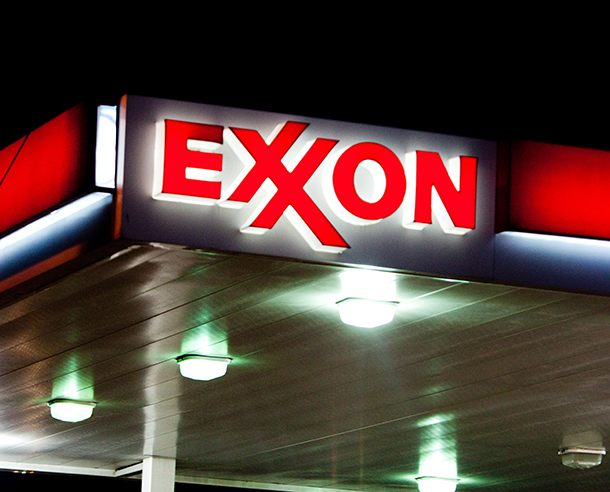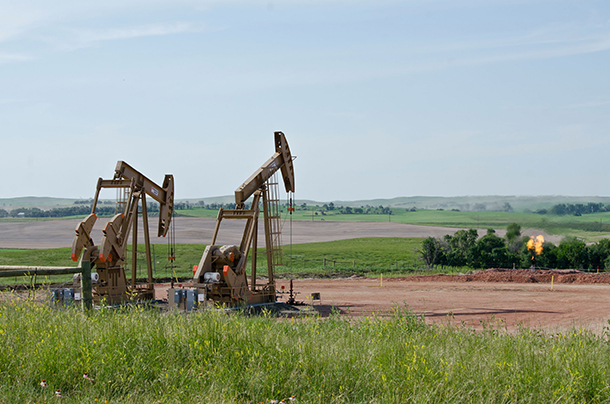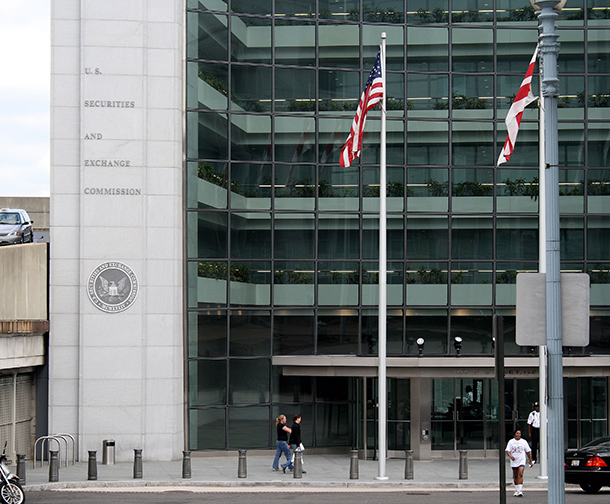SEC Probes Exxon
Air Date: Week of September 30, 2016

Exxon is under scrutiny from the U.S. Securities and Exchange Commission regarding its asset valuations in the face of lower oil prices and climate change regulatory risks. (Photo: Thomas Hawk, Flickr CC BY-NC 2.0)
The U.S. Securities and Exchange Commission is investigating whether ExxonMobil properly values its assets in relation to the regulatory risks associated with climate disruption and drastically reduced oil prices. ExxonMobil is also under scrutiny from some states’ attorneys-general, probing whether the company’s reporting to investors and the public reflects what it knew about climate change decades ago, as well as the accounting issues of interest to the SEC. Andrew Logan of nonprofit sustainability advocate Ceres, explains to host Steve Curwood how Exxon diverges from most oil and gas companies in such accounting.
Transcript
CURWOOD: In order to limit global warming to two degrees Celsius or below by the end of the century, as the Paris Agreement calls for, oil and gas companies will have to limit how much fossil fuel they can ultimately extract from the ground. That raises questions for shareholders - and regulators - about the possibility of stranded assets. Exxon Mobil is already under public scrutiny for allegedly hiding the truth its researchers had discovered about climate change, with attorneys general from the states of Massachusetts and New York conducting probes. Now the federal Securities and Exchange Commission is investigating how ExxonMobil values its assets, with lower oil prices and climate change regulations set to become tougher. Among those following this case is Andrew Logan, Director of Oil & Gas and Insurance Programs, for Ceres, a non-profit coalition of companies and investors concerned about sustainability, who joins us now. Andrew, welcome to Living on Earth.
LOGAN: Thanks for having me.
CURWOOD: So, first tell me, what does this Securities and Exchange Commission investigation involve?
LOGAN: Sure, it really involves two, in a way very simple questions: did Exxon violate accounting principals or mislead investors by failing to recognize what are called impairments of its assets anytime in the last couple of years. So, essentially the idea is, if the price of oil goes down, one would assume that the value of your assets as an oil company would go down, and if look across the industry, there have been hundreds of billions of dollars of assets that have written down essentially by every company except Exxon. And so, the question from the SEC is what makes Exxon so special if it doesn't have any assets that are being devalued, and the second, and I think more interesting part of the investigation is whether Exxon calculated the potential impacts of climate policies on its business in a way that was accurate and fair to investors.
CURWOOD: So, Andrew, briefly give us the backstory. Why is the Securities and Exchange Commission looking into Exxon's valuation practices? What's the origin of this investigation?
LOGAN: Sure, the origin goes back quite a while. If you want to trace the story to the beginning, it goes back at least 10 years to when a group of investors began raising real concerns about Exxon's business strategy in a world that is beginning to take climate change seriously and the concern there is really, if you look at the oil industry. These are companies that are investing for 10, 20, 30, 40 years in the future, and Exxon continues to make these investments in a way that assumes that the world would continue depending on oil and gas for most of its energy needs, and that the world wouldn't take any serious action on climate change.

Unlike its peer companies, Exxon Mobil has not “written down” the value of its oil and gas reserves despite the steep decline in crude oil prices that began in 2014. (Photo: Tim Evanson, Flickr CC BY-SA 2.0)
And I think, what we've seen in the last 18 months is that the world has changed in a very fundamental way. With the Paris agreement we have a real path forward on climate policy. We've seen significant innovation in technologies around electric vehicles and renewables. And so it looks like we're heading to a very different future from the one that Exxon is planning for. You know, I think we're beginning to see other companies whether it's Conoco-Phillips or Toal or Statoil realize the need to diversify their business away from fossil fuels. You see Total putting a lot of money into solar, into batteries for energy storage. You see Statoil putting a lot of money into wind. So, the industry is beginning to move, and there's a very real risk that Exxon and its investors are left behind.
CURWOOD: So, the Securities and Exchange Commission is looking at Exxon's longstanding practice of not lowering the value of its oil and gas reserves when prices fall and, of course, with the threat of more regulation of carbon. Walk me through some numbers if you have them, Andrew, about how Exxon's valuations compare to what's going on in the rest of the industry.
LOGAN: Sure. Well, I think over the last couple of years, with the price of oil falling very precipitously, from over $100 to now in the mid $40s, I think we've seen every major oil company from Chevron to Conoco to BP to Shell write-off in many cases, $10s of billions of dollars in assets. I think cumulatively, it's around a $400 billion dollar write-off across the industry. And that's something that the industry does on a regular basis when prices go up and down. If something you invested in that only makes money at $80 a barrel and the price is now down to $40 or $50, maybe it's not a viable project anymore, and so you can't carry it on your books as an asset. Where Exxon is different is that it clings to this view that eventually the price of oil will go back up to where it was before.

The headquarters of the U.S. Securities and Exchange Commission in Washington, D.C. (Photo: arsheffield, Flickr CC BY-NC 2.0)
CURWOOD: Well, one would think that in some respects they're right probably over the short-term. They may see a price increase to demand, but, of course, over the long-term science is telling us that for the planet to survive we've got to get out of burning fossil fuels.
LOGAN: Right. And you know I think the SEC doesn't allow you to simply to use your own beliefs or hopes in when it comes to accounting for your assets, and so, whatever Exxon believes about their future has to go by what the facts are on the ground and the fact right now is that the Paris Agreement is heading toward being put forth and that is going to have a very real impact on demand for oil and for the price of oil.
CURWOOD: So, how have shareholders responded to the increased public scrutiny Exxon’s policies involving climate disruption?
LOGAN: Well, it's interesting. The shareholders have clearly gotten the message that times have changed, and that the post-Paris world is a very different one for the fossil fuel industry. We’ve seen a lot of pressure from very large, very conservative investors on the company to change both its disclosure on climate change and some of its actions. So, in the spring in the run up to the Exxon-Mobil annual meeting, we saw investors with over $10 trillion in assets come out and publicly call on the company to change its stance and its actions on climate change. So, to me that was a real change in the way that investors have been looking at this company. I mean, it wasn't so long ago that Exxon really was a gold plated company that no one thought could do any wrong, and in a matter just a couple of years that has just completely turned around.
CURWOOD: Andrew, what action could the Securities and Exchange Commission take if the agency finds out that Exxon-Mobil has acted inappropriately regarding informing folks about their accounting and other disclosures regarding climate change?
LOGAN: As a public company, you never want to have the FCC come knocking on your door. And I think it could end in all sorts of ways. It could result in anything from no action at all, to an agreement with a company that changes disclosure and accounting practices, to something much more severe like a large financial penalty or a civil or criminal action. You only have to look at the last decade of SEC enforcement actions against accounting firms and banks, multi-billion dollar fines, to see how large the penalties can be.

Andrew Logan is the director of the Oil & Gas and Insurance Programs at Ceres. (Photo: Ceres)
I think as well, in a way the greatest risk that this investigation poses for Exxon is that it has the potential to really undermine investor confidence in the company. With the banks, the allegation was essentially just a perversion of their normal business practices. They were doing mortgage loans in ways that were shady are improperly disclosed. With Exxon they really are looking at the very core business of the company and a valuation of the assets without which the company has no value. So you have to assume that any outcome here where the SEC wins is one that is going to have a very profound impact on Exxon and its investors.
CURWOOD: Andrew Logan is the Director of Oil and Gas and Insurance Programs at Ceres. Thanks so much, Andrew, for taking the time.
LOGAN: Thanks for having me.
CURWOOD: We contacted Exxon for comment. Media relations manager Alan T. Jeffers sent us a statement which is posted on our website LOE.org. It reads in part:
"We are fully complying with the SEC request for information and are confident our financial reporting meets all legal and accounting requirements."
------------
WRITTEN STATEMENT from Exxon Mobil Corp. spokesman Alan Jeffers regarding the investigation:
“The SEC is the appropriate entity to examine issues related to impairment, reserves and other communications important to investors.
We are fully complying with the SEC request for information and are confident our financial reporting meets all legal and accounting requirements.”
Links
The Wall Street Journal: “SEC Probes Exxon Over Accounting for Climate Change”
Investigative reporting alleges that Exxon denied its own climate research
A conversation with Senator Sheldon Whitehouse on Exxon and the climate
ExxonMobil: “We are dedicated to reducing the risk of climate change”
Living on Earth wants to hear from you!
Living on Earth
62 Calef Highway, Suite 212
Lee, NH 03861
Telephone: 617-287-4121
E-mail: comments@loe.org
Newsletter [Click here]
Donate to Living on Earth!
Living on Earth is an independent media program and relies entirely on contributions from listeners and institutions supporting public service. Please donate now to preserve an independent environmental voice.
NewsletterLiving on Earth offers a weekly delivery of the show's rundown to your mailbox. Sign up for our newsletter today!
 Sailors For The Sea: Be the change you want to sea.
Sailors For The Sea: Be the change you want to sea.
 The Grantham Foundation for the Protection of the Environment: Committed to protecting and improving the health of the global environment.
The Grantham Foundation for the Protection of the Environment: Committed to protecting and improving the health of the global environment.
 Contribute to Living on Earth and receive, as our gift to you, an archival print of one of Mark Seth Lender's extraordinary wildlife photographs. Follow the link to see Mark's current collection of photographs.
Contribute to Living on Earth and receive, as our gift to you, an archival print of one of Mark Seth Lender's extraordinary wildlife photographs. Follow the link to see Mark's current collection of photographs.
 Buy a signed copy of Mark Seth Lender's book Smeagull the Seagull & support Living on Earth
Buy a signed copy of Mark Seth Lender's book Smeagull the Seagull & support Living on Earth

